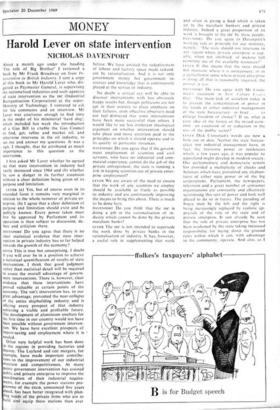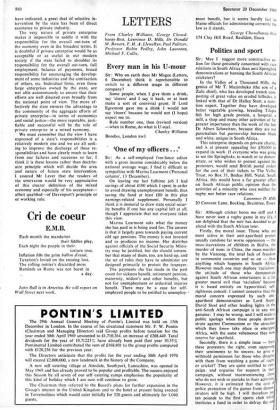MONEY Harold Lever on state intervention
NICHOLAS DAVENPORT
About a month ago under the heading 'The role of Big Brother' I reviewed a book by Mr Frank Broadway on State In- tervention in British Industry. I sent a copy of this book to Mr Harold Lever who, dis- guised as Paymaster General, is supervising the nationalised industries and such agencies of state intervention as the IRC (Industrial Reorganisation Corporation) at the super- Ministry of Technology. I ventured to ask for his comments and an interview. Mr Lever was courteous enough to find time in the midst of his ministerial 'hard slog', which included last week the introduction of a Gas Bill to enable the Gas Council to find, get, refine and market oil, and otherwise intervene in the oil industry, to see me and answer my questions. It was a sign, I thought, that he attributed as much importance to this question as the
SPECTATOR.
I first asked Mr Lever whether he agreed (a) that state intervention in industry had vastly increased since 1964 and (b) whether he saw a danger in its further extension without a clear definition being given of its purpose and limitation.
LEVER (a) Yes, but of course even in its extended form it remains very marginal in relation to the whole turnover of private en- terprise. (b) I agree that a clear definition of purpose and limitation should exist and be publicly known. Every power taken must first be approved by Parliament and its operation is then subject to discussion, de- bate and criticism there.
DAVENPORT Do you agree that there is no clear statistical evidence that state inter- vention in private industry has so far helped towards the growth of the economy?
LEVER This is true but unsurprising. I doubt if you will ever be in a position to achieve a statistical quantification of results of state intervention. I think that good judgment rather than statistical detail will be required to assess the overall advantage of govern- ment interventions. There is, however, clear evidence that these interventions have proved valuable at certain points of the economy. The SIB'S intervention has, to our great advantage, prevented the near-collapse of the entire shipbuilding industry and is offering every prospect of that industry achieving a viable and profitable future. The development of aluminium smelters for the first time in our country would not have been possible without government interven- tion. We have here excellent prospects of import-saving and employment where it is needed.
Other very helpful work has been done in the regions in providing factories and finance. The Leyland and cec mergers, for example, have made important contribu- tions to the improvement of our industrial structure and competitiveness. At many Points government intervention has assisted Public and private enterprise to improve the oordination of their industrial require- ments, for example the power stations pro- ramme of the CEGB, announced five years head, has been better integrated with plan- tag needs of the private firms who are to ild and equip these stations than ever
before. We have assisted the redeployment of labour and factory space made redund- ant by rationalisation. And it is not only government money but government re- sources and knowledge that is continuously placed at the service of industry.
No doubt a critical eye will be able to discover interventions with less obviously happy results but, though politicians are not apt in their oratory to place emphasis on their failures, even objective observers need not feel dismayed that some interventions have been more successful than others. would like to see less irrelevant theological argument on whether intervention should take place and more attention paid to the principles on which it should operate and to its quality in particular instances.
DAVENPORT Do you agree that if the govern- ment employment of scientists and civil servants, who have no industrial and com- mercial experience, cannot do the job of the private entrepreneur, the state is running a risk in keeping scientists out of private enter- prise employment?
LEVER We are aware of the need to ensure that the work of any scientists we employ should be available as freely as possible to industry and are continuously improving the means to bring this about. There is much to be done here.
DAVENPORT Do you think that the IRC is doing a job in the rationalisation of in- dustry which cannot be done by the private merchant banks?
LEVER The IRC is not intended to supersede the work done by private banks in the rationalisation of industry. It has, however, a useful role in supplementing that work and often in giving a lead which is taken up by the merchant bankers and private Industry. Indeed a great proportion of its work is brought to the IRC by these people. rPtvPsPoter. Do you agree to Davenport's working rule or principle for our ministry. namely: 'The state should not intervene in any region where private enterprise is cap- able, when not inhibited, of making full economic use of the available resources'?' I IA 1.R If this means that the state should not intervene where it is unnecessary, or in a perfectionist sense where private enterprise is doing all that is reasonably required, the a 11S1A er is yes.
DA % rwoRT Do you agree with Mr Cross- man's statement in New tuition l:%,avv that: 'Hie main task of socialism today is to prevent the concentration of power in the hands of either industrial management or the state bureaucracy- in brief . . to enlarge freedom of choice"? If so. what is your idea of the future of the mixed econ- omy--an extension of or reduction in the We of the public sector?
LEVER Dick Crossman's words are now a little out ot date. Neither the state bureau- cracy nor industrial management have, in fact, the fearsome power or tendencies which, a few years ago, it was popular to apprehend might develop in modern society. Our parliamentary and democratic system has provided a multiplicity of checks and balances which have prevented any elephan- tiasis of either state power or of the big corporations. Parliament, the newspapers. television and a great number of consumer organisations are constantly and effectively scrutinising this sort of power and look well placed to do so in future. The parading of bogey men by the left and the right is being increasingly replaced by realistic ap- praisals of the role of the state and of private enterprise. It can already be seen that the role of private enterprise has not been weakened by the state taking increased responsibility for laying down the ground rules within which it can, with advantage to the community, operate. And also, as I
ffolkes's taxpayers' alphabet
B is for Budget speech
have indicated, a great deal of selective in- tervention by the state has been of direct assistance to private industry.
The very nature of private enterprise makes it impossible to saddle it with the responsibility for the overall out-turn of the economy even in the broadest terms. It is doubtful if private enterprise would be as acceptable or as useful in our modern society if the state failed to shoulder its responsibility for the overall out-turn, full employment, balance of payments, broad responsibility for encouraging the develop- ment of some industries and the contraction of others, etc. Individual firms, even those large enterprises owned by the state, are not able autonomously to ensure that their efforts are well directed even broadly from the national point of view. The more ef- fectively the state ensures the advantage to the community of the aggregate efforts of private enterprise—in terms of economics and social justice—the more reputable, justi- fiable and successful will be the role of private enterprise in a mixed economy.
We must remember that the view I have expressed of a state's responsibilities is a relatively modern one and we are all seek- ing to improve the discharge of these re- sponsibilities and have clearly much to learn from our failures and successes so far. I think it is these lessons rather than doctrin- aire principle which will decide the area and nature of future state intervention. I assured Mr Lever that the readers of the SPECTATOR would be very appreciative of this clearer definition of the mixed economy and especially of his acceptance— albeit qualified—of Davenport's principle or or working rule.



































 Previous page
Previous page